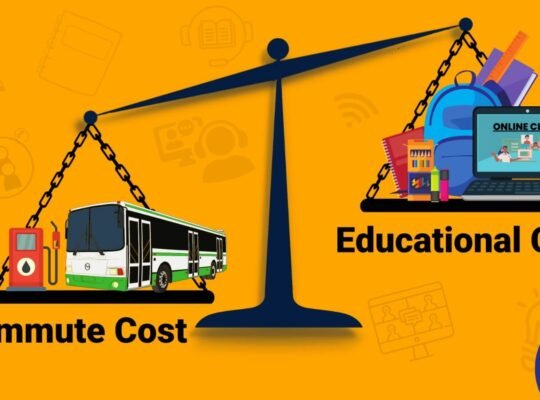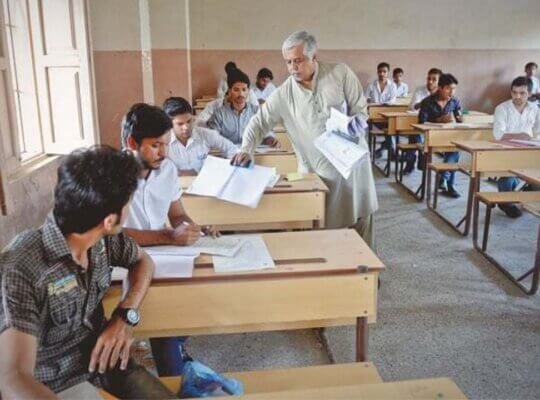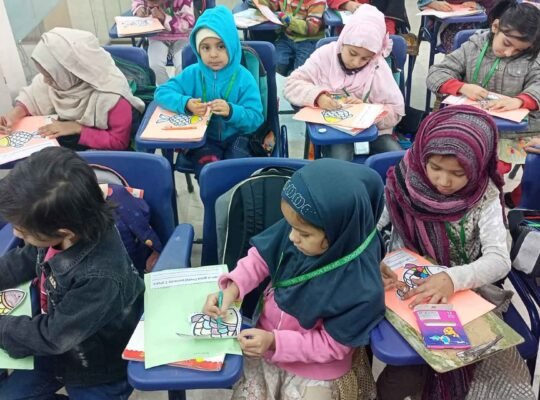In Pakistan, 22 million children are without an education, their dreams put on hold by an education crisis of unprecedented proportions. But amidst the despair, a glimmer of hope shines through in the form of ChatGPT, an advanced language model developed by OpenAI.
This technology holds the potential to revolutionise the country’s education system, giving children in remote and underprivileged areas access to education in their own languages and providing them with the opportunity to learn, thrive and reach their full potential. But as this technology is implemented, it is crucial that ethical considerations are taken into account, ensuring that ChatGPT is not only a tool for progress but also a tool for educational justice, inclusivity and protecting children’s rights.
Overcoming Fear

For many teachers in Pakistan, embracing new technology can be daunting. They may be hesitant to use new tools in the classroom, concerned about the complexity of the technology or need more skills to use it effectively. But the truth is that embracing new technology is essential for helping students succeed in a constantly changing world.
ChatGPT can help educators generate language-based materials such as lesson plans, quizzes, and assessments, saving valuable time and resources. It can also provide personalised learning experiences for students, especially those in remote and underprivileged areas. Furthermore, it can be used to reach out-of-school children in remote areas by generating educational materials in local languages, making education more accessible to children who may not speak English.
To fully realise the potential of ChatGPT, it is vital that teachers are involved and supported. The government of Pakistan must provide teachers with the necessary equipment and resources, training and ongoing support and encourage them to share their experiences and best practices with each other.
Unlocking Potential

The power of technology in education is undeniable, as seen with the implementation of Google and digital whiteboards in the classroom. When educators were given the opportunity to experience the benefits of these technological advancements, they were able to see the potential they held for improving the learning experiences of their students. As educators, our ultimate goal is to provide our students with the best possible education, and the use of technology in the classroom allows us to do just that.
Change can be difficult, but it is necessary for progress. By providing teachers with training and support, we can help them overcome their hesitation and fully embrace the potential of ChatGPT, revolutionising education in Pakistan and giving children a chance to achieve their dreams.
Educational Fusion

It’s important to note that the implementation of ChatGPT should not be viewed as a replacement for traditional teaching methods but rather as a complement to them. As technology advances, it’s essential to find ways to integrate it into classroom instruction in a way that enhances learning and supports student engagement.
Moreover, while ChatGPT may help generate educational materials in local languages, it’s also vital to ensure that the content is culturally relevant and appropriate. This means that educators and experts must be involved in the process of reviewing and approving the materials generated by ChatGPT to ensure that it aligns with the curriculum and learning goals.
Another critical aspect to consider is the internet and technology infrastructure availability. In order to fully utilise ChatGPT, it’s vital to ensure that the necessary technology is in place and that students and teachers have access to it. This includes providing access to the internet, laptops, tablets and other necessary equipment to schools and remote areas.
Navigating the Risks

However, as the integration of ChatGPT into the education system becomes more widespread, it’s crucial that we consider the potential dangers associated with it. For students and teachers, the most significant risk is the loss of critical thinking skills. With the ability to generate vast amounts of information and materials, ChatGPT can create a generation of students who depend on technology for answers rather than developing the ability to think critically and independently.
Moreover, the use of ChatGPT also raises essential ethical considerations, such as protecting students’ privacy and security. With the increasing use of technology in education, there is a risk that students’ personal information could be vulnerable to breaches or misuse. Educators and institutions must take the necessary steps to ensure that students’ data is adequately secured and that they are aware of the potential risks associated with the use of technology in the classroom.
First Mover Advantage

As the founder of a not-for-profit institute named “Off The School” (OTS), located in Karachi’s Martin Quarters area, I have dedicated my life to providing education to underprivileged children and improving the education system in Pakistan. The staggering statistics of over 22 million out-of-school children in the country are a constant reminder of the urgent need for innovative solutions to tackle the education crisis.
That is why, when I learned about the potential of ChatGPT, I knew I had to act fast. I immediately started training over 100 teachers at my school on using ChatGPT to generate language-based materials such as lesson plans, quizzes and assessments and how to educate students on its possible benefits and potential dangers. The results have been extraordinary. Teachers have saved valuable time and resources and provided personalised learning experiences for students. They have created interactive and engaging lessons that have captivated the students’ attention.
Reaching the Unreachable

ChatGPT can enable teachers to reach out-of-school children in remote and underprivileged areas, providing them with the education they may not have otherwise. At OTS, we are constantly looking for ways to mitigate the educational crisis in Pakistan. We regularly upload intriguing educational videos on our social media channels which are free of charge. Further, we offer live classes that have reached out to people in over 50 cities and villages in Pakistan. With the help of ChatGPT, we can now generate easy and helpful content for students hailing from underserved communities. Using ChatGPT has also enabled us to create language-based materials such as lesson plans, quizzes, and assessments tailored to these students’ needs. By making education more accessible to these students, we are helping to bridge the gap between the privileged and underprivileged and making a meaningful impact on their lives. Separately, 1,900 girls and boys from marginalised communities receive formal education from kindergarten to grade 8 and supplementary tuition for grades 9 to 12 in both science and commerce groups. Besides formal education, students learn IT skills such as web development, android development, video editing, and graphic designing. They also learn different languages, such as English, Turkish, Arabic, and Persian.
Additionally, our students receive training in digital marketing, e-commerce, and social media handling, all essential skills for today’s digital landscape. This approach helps students get better job opportunities and empowers them to be self-sufficient and successful. Along with all this, they receive religious education, an essential aspect of our culture and society.
A Call to Action

It is undeniable that the educational crisis in Pakistan is a complex and challenging issue that demands the collective efforts of all stakeholders to address it. As an education activist, my heart aches for the millions of underprivileged children in Pakistan who are denied the right to education. I have dedicated my life to providing education to these children and improving Pakistan’s education system, but I cannot do it alone.
The government must take immediate and decisive action to tackle the root causes of the crisis, such as poverty, lack of infrastructure and access to education. The private sector and NGOs must also step forward and support the cause. Together, we must work towards ensuring that every child in Pakistan has access to quality education, regardless of their background or circumstances.
In this fight for education, technology has a crucial role to play. ChatGPT, the advanced language model developed by OpenAI, has the potential to revolutionise the education system in Pakistan. Using ChatGPT to generate language-based materials such as lesson plans, quizzes and assessments tailored to the needs of underprivileged children, we can bridge the gap between the privileged and underprivileged and make a meaningful impact on their lives. Additionally, ChatGPT can reach out-of-school children in remote and underprivileged areas, providing them with access to education that they may not have otherwise. It is imperative that the government and NGOs provide teachers with the necessary training and support to help them integrate ChatGPT into their teaching practice in an ethical way. Only by doing so can we ensure that our children have the skills and knowledge they need to succeed in the 21st century. We owe it to our children to provide them with the best possible education and give them the future they deserve. Together, let us join hands in this noble cause and make education accessible to every child in Pakistan.

Meet Najam Soharwardi, a Chevening Scholar and education advocate founded “Off The School” (OTS) to provide formal education to underserved communities.








